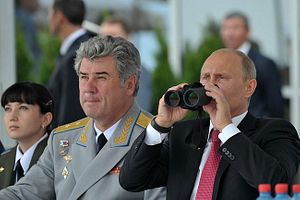A senior Russian official appeared to issue a nuclear threat against Ukraine over Crimea on Wednesday.
In recent weeks, numerous senior level Ukrainian officials have promised to return Crimea to Ukraine despite Russia’s decision to annex it earlier this year. Following his appointment as Ukraine’s new minister of defense, Colonel General Valeriy Heletey promised the parliament in Kiev he would work to retake Crimea from Russia.
“Believe me, there will be a victory parade — there will be for sure — in Ukraine’s Sevastopol,” Heletey said, referring to the capital city of Crimea. At the same hearing, Heletey pledged he “will work day and night for restoring the military capability of our armed forces.” Similar pledges have been made by Ukraine President Petro Poroshenko, who has promised to oversee the “revival of the army,” as well as Ukraine Foreign Minister Pavlo Klimkin.
When asked about these comments at a press conference on Wednesday, Russian Foreign Minister Sergey Lavrov responded, “If it comes to aggression against Russian territory, which Crimea and Sevastopol are parts of, I would not advise anyone to do this.” He then added, “We have the doctrine of national security, and it very clearly regulates the actions, which will be taken in this case.”
This is a not-so-subtle threat to use nuclear weapons to retain Crimea. Since the collapse of the Soviet Union, Russia’s conventional military capabilities have deteriorated significantly. As a result, it has come to be increasingly reliant on nuclear weapons to protect its national security. This has been reflected in its post-Cold War military doctrines, particularly the ones since 2000. These military doctrines have greatly reduced the threshold that would needed to be crossed before Russia would resort to the use of nuclear weapons.
Most notably, Russia’s military doctrines starting in 2000 introduced the concept of de-escalation, which is “a strategy envisioning the threat of a limited nuclear strike that would force an opponent to accept a return to the status quo ante.” In other words, Russian military doctrines have said that Moscow will use limited nuclear strikes in response to conventional military attacks against it. The most recent military doctrine issued in 2010, for example, states:
“The Russian Federation reserves the right to utilize nuclear weapons in response to the utilization of nuclear and other types of weapons of mass destruction against it and (or) its allies, and also in the event of aggression against the Russian Federation involving the use of conventional weapons when the very existence of the state is under threat.”
It was this military doctrine that Lavrov was referring to at the press conference this week. As quoted above, Lavrov began by emphasizing that Moscow sees Crimea as an integral part of Russian territory. He then stated that Moscow has a military doctrine that “very clearly” outlines how Moscow would respond to threats to its territorial integrity. The military doctrine “very clearly” states that the “Russian Federation reserves the right to utilize nuclear weapons” in these situations.
This is not the first time a Russian official has issued a nuclear threat against its neighboring states. For example, as tensions rose between Russian and several former Soviet Union and Warsaw states in 2011, General Staff Chief Gen. Nikolai Makarov warned a Russian legislative body that:
“The possibility of local armed conflicts virtually along the entire perimeter of the border has grown dramatically. I cannot rule out that, in certain circumstances, local and regional armed conflicts could grow into a large-scale war, possibly even with nuclear weapons.”
To enhance the credibility of its threat to use nuclear weapons, Russia’s armed forces have conducted regular military drills since 2000 in which a limited nuclear strike is simulated. These drills have become increasingly common since the Ukraine crisis began. In some cases, Vladimir Putin has ordered snap drills simulating nuclear strikes.

































